
Paul Gauguin Sunken lane 1884

Nebojsa Malic, senior writer at RT, lived through the Yugoslavia civil war.
• Dear America, Civil War Is Not A Joke – Or A Picnic (RT)
Critics have reacted to President Donald Trump’s Twitter warning about his impeachment causing a civil war with both shrieks of outrage and jokes. Notably absent: any self-awareness of what such a war would be like or how to avoid it. “If the Democrats are successful in removing the president from office, I’m afraid it will cause a Civil War-like fracture in this nation from which this country will never heal,” Texas televangelist Robert Jeffress said Sunday night on Fox News. Trump quoted him in a tweet the next morning, and Twitter lost its collective mind. The typical response was to accuse Trump of calling for a new civil war, mind-reading what he must have really meant by the quote. He was “priming his base” to think of war, according to unnamed “experts of fascism,”a liberal comedian argued in just one example.
Others dismissed the very notion of a civil war as crazy, joking about bringing the potato salad and biodegradable forks – or hamberders and covfefe – to the fight, as soon as they get out of yoga class, using the hashtag #CivilWarSignup. There were also scornful takes about Americans being too fat to fight, or rural Americans being too scared to “take the subway in New York or drive in Los Angeles,” much less take a rifle and “take their country back from elite urbanites.” It’s unclear whether the people joking about bringing food to the fight were deliberately channeling the spirit of Washingtonians who turned out to the first Battle of Manassas/Bull Run, in June 1861, as if it were a picnic, bringing baskets and blankets to enjoy the show.
As anyone who’s studied that era of US history knows, their glee quickly turned to horror and panic, when the Union army lost – and they found themselves shoved aside on crowded roads leading back to Washington by the routed troops in blue. Wars never go as planned. No plan survives first contact with the enemy, who also gets a vote. If there is one ironclad rule of war through the ages, no matter the level of technology, that is it. Yet the corollary is that civilians always forget about it, and it comes back to bite them.

“Does this sound a little like part of the origin story of RussiaGate? Is that not exactly the potential criminal matter that the current attorney general, Mr. Barr, is officially investigating?”
Someone in Impeachmentville is not paying attention. Of course, diverting the rubes is exactly the point of the latest CIA operation to negate the 2016 election. Has nobody noticed that there is treaty between Ukraine and the USA, signed at Kiev in 1998 and ratified by the US Senate in 2000. It’s an agreement on “Mutual Legal Assistance in Criminal Matters.” Here, read the cover letter for yourself:
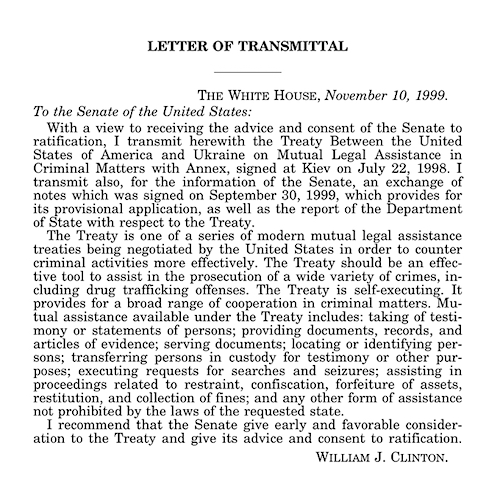
What part of the following do Nancy Pelosi and the news media not understand? “The Treaty is self-executing. It provides for a broad range of cooperation in criminal matters. Mutual assistance available under the Treaty includes: taking of testimony or statements of persons; providing documents, records, and articles of evidence; serving documents; locating or identifying persons; transferring persons in custody for testimony or other purposes; executing requests for searches and seizures; assisting in proceedings related to restraint, confiscation, forfeiture of assets, restitution, and collection of fines; and any other form of assistance not prohibited by the laws of the requested state… ([etc].”
How does this not permit Mr. Trump asking the president of Ukraine for “assistance” in criminal matters arising out of “collusion with Russia,” as specified within the scope of Robert Mueller’s special prosecutor activities? For instance, the matter of CrowdStrike. The cybersecurity firm was co-founded by Russian ex-pat Dmitri Alperovitch, who also happens to be a senior fellow at the Atlantic Council, an anti-Russian think tank funded by Ukrainian billionaire, Viktor Pinchuk, who donated at least $25 million to the Clinton Foundation before the 2016 election. Crowdstrike was the company that “examined” the supposedly hacked DNC servers, while somebody in the Obama administration prevented the FBI from ever seeing them. Does this sound a little like part of the origin story of RussiaGate? Is that not exactly the potential criminal matter that the current attorney general, Mr. Barr, is officially investigating?

Obvious nonsense though it may be, people will continue to accuse me of supporting Trump. But you can’t accuse Ron Paul of that.
• Impeachment…or CIA Coup? (Ron Paul)
You don’t need to be a supporter of President Trump to be concerned about the efforts to remove him from office. Last week House Speaker Nancy Pelosi announced impeachment proceedings against the President over a phone call made to the President of Ukraine. According to the White House record of the call, the President asked his Ukrainian counterpart to look into whether there is any evidence of Ukrainian meddling in the 2016 election and then mentioned that a lot of people were talking about how former US Vice President Joe Biden stopped the prosecution of his son who was under investigation for corruption in Ukraine.
Democrats, who spent more than two years convinced that “Russiagate” would enable them to remove Trump from office only to have their hopes dashed by the Mueller Report, now believe they have their smoking gun in this phone call. It this about politics? Yes. But there may be more to it than that. It may appear that the Democratic Party, furious over Hillary Clinton’s 2016 loss, is the driving force behind this ongoing attempt to remove Donald Trump from office, but at every turn we see the fingerprints of the CIA and its allies in the US deep state. In August 2016, a former acting director of the CIA, Mike Morell, wrote an extraordinary article in the New York Times accusing Donald Trump of being an “agent of the Russian Federation.”
Morell was clearly using his intelligence career as a way of bolstering his claim that Trump was a Russian spy – after all, the CIA should know such a thing! But the claim was a lie. Former CIA director John Brennan accused President Trump of “treason” and of “being in the pocket of Putin” for meeting with the Russian president in Helsinki and accepting his word that Russia did not meddle in the US election. To this day there has yet to be any evidence presented that the Russian government did interfere. Brennan openly called on “patriotic” Republicans to act against this “traitor.” Brennan and his deep state counterparts James Comey at the FBI and former Director of National Intelligence James Clapper launched an operation, using what we now know is the fake Steele dossier, to spy on the Trump presidential campaign and even attempt to entrap Trump campaign employees. Notice a pattern here?

Too predictable to be newsworthy.
• Hillary Clinton’s Big Comeback Begins Tuesday (WT)
Media attention will intensify on Hillary Clinton on Tuesday. The former first lady, senator, secretary of state and Democratic presidential candidate is ready for another round in the public arena. She has a new book arriving, written with the help of a very close relative. Behold. Here comes “The Book of Gutsy Women: Favorite Stories of Courage and Resilience” — all 464 pages of it. Indeed, the new book of essays now landing on the shelves is written by Mrs. Clinton and her daughter Chelsea Clinton, is published by Simon & Schuster. Some informed observers speculate the book could be yet another indicator — along with increased public appearances and commentary — that Mrs. Clinton pines for a political comeback.
What kind of comeback? Oh, maybe the bumper stickers will read BIDEN/CLINTON 2020, WARREN/CLINTON 2020 — or even CLINTON/CLINTON 2020. Who the heck knows? “Word on the political street now is the rumbling that the impeachment probe launched by House Speaker Nancy Pelosi may be the crack that opens the door for another presidential run by Hillary Clinton. This time, the thinking goes, Hillary would be running with vindication that the 2016 election was ‘stolen’ from her and she can ascend in 2020 to reclaim the mantle for her party and the majority of the country that voted for her,” writes Nate Ashworth, editor in chief of Election Central.

Wolf Richter mostly manages to deny his own headline.
• US Dollar Status as Global Reserve Currency Slides (WS)
If the US dollar loses its hegemony as a global reserve currency, it would be a sea change globally, and specifically for the US economy. Today, we got the next installment in that saga, via the IMF’s quarterly COFER data on foreign exchange reserves. Total global foreign exchange reserves in all currencies ticked up 1.1% from the first quarter, to $11.7 trillion. US-dollar-denominated exchange reserves rose only 0.7% to $6.79 trillion, and their share of total global foreign exchange reserves fell to 61.63%, down from 61.86% in the prior quarter. And this has been going on for years in baby steps:
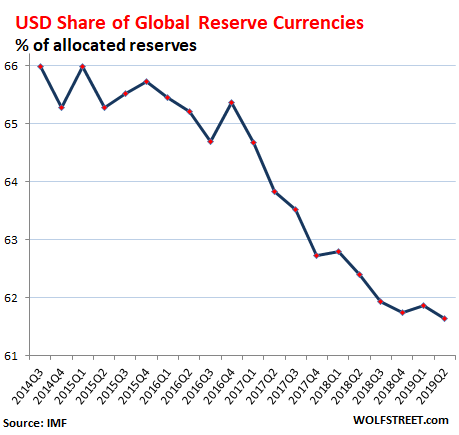
The US dollar’s share of global reserve currency declines when central banks other than the Fed proportionately reduce their dollar-denominated assets and add assets denominated in other currencies. Compared to the mega-moves in the 1970s, the recent moves have been muted. Nevertheless, the current share of USD-denominated foreign exchange reserves of 61.63% is the lowest since the year-end in 2013. The bump in 2014, 2015, and 2016 has now been unwound:
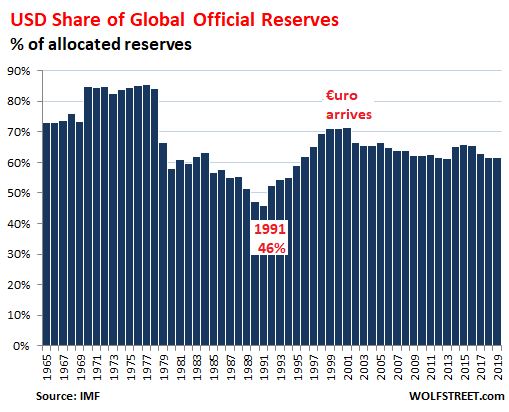
These US-dollar-denominated exchange reserves are US Treasury securities, US corporate bonds, and other financial assets that central banks other than the Fed are holding in their foreign exchange reserves. The Fed’s own holdings of Treasury securities and Mortgage-Backed Securities are not included in “foreign exchange reserves.” However, the Fed’s holdings of foreign-currency denominated assets are included in the other currencies. Unlike some other central banks, the Fed holds just a smidgen in foreign currency assets – currently $20.6 billion worth, compared to, for example, China’s $3.1 trillion in foreign exchange reserves.
[..] The chart below shows the dollar’s slowly declining but still hegemonic share of foreign exchange reserves, the euro’s essentially flat share, and the other reserve currencies’ comparatively tiny share. The renminbi (RMB) is the short red line near the very bottom:
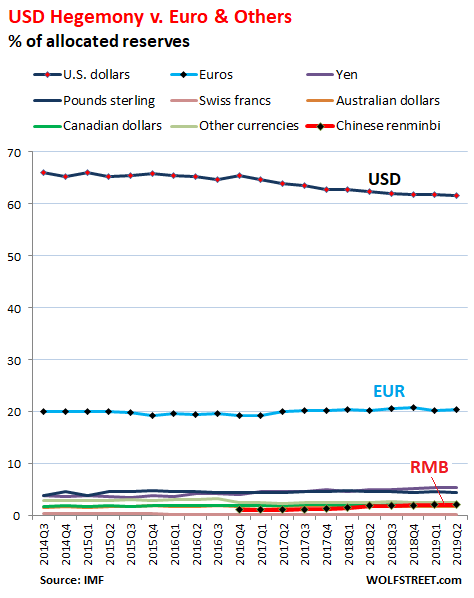
To shed some light on the tangle of currencies at the bottom of the chart above, it’s useful to look at them without the US dollar and the euro overshadowing the neighborhood:
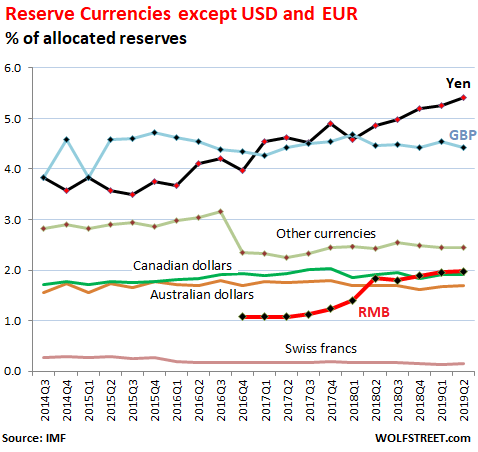

Inflation is not Europe’s problem. The ECB is.
• No End In Sight For ECB’s Inflation Problem (MW)
Unemployment in the eurozone declined to 7.4% in September, its lowest level since August, 2008, the EU’s statistics institute Eurostat said Monday. But this good news about the European economy helps underline the predicament the European Central Bank has long struggled with: the persistent low level of inflation. The ECB has undershot its official price stability target, set at “below but close to 2%”, every year since 2013. Keeping the eurozone on that steady inflation path is the only official remit of the ECB. It hasn’t been tasked with other economic policy objectives, like the U.S. Federal Reserve on employment, or the Bank of England on supporting the government’s economic objectives.
Inflation in the eurozone stood at an annual 1% in August, according to Eurostat. The closest the ECB was to its target was last year, when inflation reached 1.8%. That was up from 1.5% in 2017, and 0.2% in both preceding years. The risk of debilitating deflation – falling prices – was the rationale behind the ECB’s first massive quantitative easing program, launched in 2015. The central bank is now citing the financial markets’ declining inflation expectations for 2021 as the main reason for its latest monetary easing package, announced on September 12: They have fallen from 1.8% to 1.5% since the beginning of this year, according to ECB chief economist Philip Lane.

“..the 77th Brigade is giving the British military “the capability to compete in the war of narratives at the tactical level..”
• Twitter Executive For Middle East Is British Army ‘Psyops’ Soldier (MEE)
The senior Twitter executive with editorial responsibility for the Middle East is also a part-time officer in the British Army’s psychological warfare unit, Middle East Eye has established. Gordon MacMillan, who joined the social media company’s UK office six years ago, has for several years also served with the 77th Brigade, a unit formed in 2015 in order to develop “non-lethal” ways of waging war. The 77th Brigade uses social media platforms such as Twitter, Instagram and Facebook, as well as podcasts, data analysis and audience research to wage what the head of the UK military, General Nick Carter, describes as “information warfare”.
Carter says the 77th Brigade is giving the British military “the capability to compete in the war of narratives at the tactical level”; to shape perceptions of conflict. Some soldiers who have served with the unit say they have been engaged in operations intended to change the behaviour of target audiences. What exactly MacMillan is doing with the unit is difficult to determine, however: he has declined to answer any questions about his role, as has Twitter and the UK’s Ministry of Defence (MoD). Twitter would say only that “we actively encourage all our employees to pursue external interests”, while the MoD said that the 77th Brigade had no relationship with Twitter, other than using it for communication.
The 77th Brigade’s headquarters is located west of London. It brought together a number of existing military units such as the Media Operations Group and the 15 Psychological Operations Group. At its launch, the UK media was told that the new unit of “Facebook warriors” would be around 1,500 strong, and made up of both regular soldiers and reservists. In recent months, the army has been approaching British journalists and asking them to join the unit as reservists.

In reality, he’s preparing to blame everyone else for his own failures. And Dominic Cummings will blame Boris.
• Johnson Planning To Bypass Brussels In Bid For New Brexit Deal (Ind.)
Boris Johnson is to attempt a last-ditch charm offensive on EU leaders to get a Brexit deal over the line, after delivering his proposals for a new withdrawal agreement to Brussels as early as the end of this week. With EU chief negotiator Michel Barnier viewed in Downing Street as a stickler for rules who will be hard to shift from the deal struck with Theresa May, Mr Johnson is keen to speak with key European leaders who may be ready to show flexibility ahead of the crunch Brussels summit on 17 October. Plans were made to fly the prime minister to the funeral of ex-president Jacques Chirac for talks in the margins with sympathetic leaders, but it was decided the opportunity did not justify breaking off his attendance at the Conservative conference in Manchester.
London believes a key to any deal will be securing the acceptance of Irish premier Leo Varadkar and German chancellor Angela Merkel. News that negotiator David Frost has finalised a legal text of the UK proposals – said by a senior government source to be “game changing” – emerged as ministers attending cabinet admitted that they were not absolutely sure what the PM plans to do if his hopes of a deal fall flat. With speculation that the plan is known only to a tiny circle around Mr Johnson and his chief adviser Dominic Cummings, housing minister Esther McVey said she did not “know what is necessarily going on in Boris’s head”, while even chancellor Sajid Javid when asked if he knew what the PM would do could say only that “I think I do”.

And you thought they’d steer clear of hammering Good Friday…
• UK Proposes Customs Posts On Both Sides Of Irish Border (RTE)
The UK has proposed the creation of a string of customs posts along both sides of the Irish border as part of its effort to replace the backstop, RTÉ News understands. The ideas, which would be highly controversial, are contained in proposals sent from London to the European Union – extracts of which have been seen by RTÉ News. The proposals would effectively mean customs posts being erected on both sides of the border, but located perhaps five to ten miles ‘back’ from the actual land frontier. This is because under British Prime Minister Boris Johnson, the UK is insisting that Northern Ireland remain completely outside the EU’s customs union for industrial goods and agri-food products.
Even more controversial is a proposal that the goods moving from a so-called “customs clearance site” on the northern side of the border to a similar site on the southern side would be monitored in real time using GPS via mobile phone data, or tracking devices placed on trucks or vans. The ideas are contained in one of four so-called ‘non-papers’ submitted by UK officials during recent technical discussions in Brussels. Under the British proposals, both the UK and EU would create what are believed to be called “customs clearance sites”, but to all intents and purposes a customs post. Traders would have a choice of either a straightforward customs declaration which would have to be lodged and cleared on either side of the border, or the so-called ‘transit’ system.
Under a transit scheme, the exporter becomes a registered ‘consigner’ at base, and the importer becomes a registered ‘consignee’. The method requires a bond from a financial institution to guarantee that the relevant customs duty, excise and VAT have been paid and that the goods do not go illegally off the beaten track en route. The UK proposals have been discussed in technical talks with the European Commission’s Brexit Task Force under Michel Barnier. However, the details of the four non-papers have not been disclosed to EU member states.

Macron playing Napoleon again. He can’t stop himself.
• France’s Overtures Toward Russia (Moisi)
French President Emmanuel Macron is convinced that now is the right time to reset relations with Russia. He has therefore made it a diplomatic priority to restore a climate of trust between Paris and Moscow. Three compelling reasons underlie this move… First and foremost, the international strategic context has changed dramatically. China is rising, while the United States, although still the world’s dominant power, is distancing itself from its global responsibilities. And Russia, with an aging, shrinking population and a huge, largely uninhabited landmass, is a natural prey for China’s long-term ambitions. European leaders should not resign themselves passively to seeing Russia, lacking any other alternative, align with China.
Instead, they should try to convince Russians that their future is with Europe, and not as China’s junior partner in a deeply unbalanced relationship. Russia’s destiny lies in the West, not the East. Moreover, although Russia is no match for China, it has returned as a serious global actor. Many current conflicts, from Eastern Europe to the Middle East, simply cannot be addressed without involving Russia. This represents a triumph of sorts for Russian President Vladimir Putin, who first came to power nearly 20 years ago pledging to restore his country’s geopolitical clout. In particular, Putin wanted the US to treat Russia not as a mere object of history, as it had done under his predecessor Boris Yeltsin, but as a real interlocutor.
And while it might be impossible to restore the bipolar world of the Cold War years, at least the US would be forced to recognize the importance of a modernized and operational Russian army that could intervene in the former Soviet sphere and beyond. This represents a triumph of sorts for Russian President Vladimir Putin, who first came to power nearly 20 years ago pledging to restore his country’s geopolitical clout. In particular, Putin wanted the US to treat Russia not as a mere object of history, as it had done under his predecessor Boris Yeltsin, but as a real interlocutor.

If these revelations don’t stop Assange’s extradition, nothing will. And Britain will be nothing but a deep black hole.
• Assange’s Lawyers Were Under Surveillance. That’s Not The Whole Story (Canary)
A private security company organised 24/7 surveillance of WikiLeaks founder Julian Assange during his stay at the Ecuadorian embassy in London. This included confidential meetings between Assange and members of his legal team. The surveillance was provided directly to the CIA. These revelations could possibly jeopardise the viability of the US extradition case. But within this story there lies another that raises serious questions about the establishment media and allegiances. According to El Pais, Spanish security firm UC Global was responsible for the surveillance of Assange when he was a guest of the Ecuadorian government at their London embassy. UC Global, a firm with an address in Jerez de la Frontera (Cádiz), was hired by Senain, the former Ecuadorian intelligence service, ostensibly to provide protection for Assange.
However, it’s now been revealed that the company’s owner David Morales passed on the results of the operations to the CIA. He even installed a video streaming service direct to the US. Also monitored were meetings between Assange and his lawyers, including Melynda Taylor, Jennifer Robinson, and Baltasar Garzón. After Rafael Correa was replaced by the right-wing Lenín Moreno as president of Ecuador in May 2017, the latter cancelled the UC Global contract. Moreno then issued a new contract to Ecuadorian company Promsecurity. Video recordings and photos taken by that firm were subsequently used in an extortion attempt.












Home › Forums › Debt Rattle October 1 2019